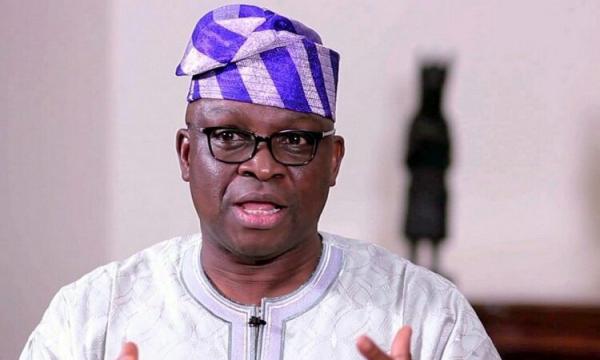
Nigerian President Muhammadu Buhari
The country, in an unfortunate twist, has begun to grapple with the harsh realities of dwindling oil revenue and both the federal and state governments are reeling under the hardship of an oil proceed past its boom cycle.
Just of late, the media was awash with the vile confession of the then coordinating minister of the economy, Dr Ngozi Okonjo- Iweala, that Nigeria has borrowed about N473 billion to pay salaries and fund the 2015 budget. The situation is very pathetic, coming on the heels of a federal government that has expended nearly a half of its projected borrowing allowance for 2015, which is put at N953.6 billion. This constitutes 21 per cent of this year’s budget.
The nation’s age-long ineptitude and unstructured federal system are now at an inevitable crossroads and we are left with no other option than to bemoan the unpalatable depth the nation has sunk and the economy wallows in the abyss. As irritable as it may resonate in the ear, the ugly truth remains that no single refinery in Nigeria works at full capacity and by virtue of this, the country’s largest import in the last sixteen years has been refined crude. The avalanche of uncertainties witnessed in the distribution of oil in the last few months could as well pass as a deep reflection of the comatose state the Nigerian State.
With a debt profile standing at over $60 billion, the new government has already been beset with an enormous task that might prove intractable without a thorough rejigging of the constitution. Observers have begun to express concerns about the odious spectacle of a looming recession if the component units of the Nigerian State are rendered moribund on the altar of the overwhelming political and economic influence arrogated to the centre.
Among the most fundamental questions which the nation, for no just reason, has been rather hesitant in proffering answer to is whether the current federal system is actually yielding the synergy of the component units. The answer is NO. It is sad to note that in spite of floating a seemingly stable republic in the last sixteen years, the path to a workable Nigerian constitution is still riddled with mines of the military form of government, which has been the underlying malaise behind its unworkability.
Bringing Oyo State to the fore, it is somewhat implausible to hatch a blueprint that would elicit on the evolvement of an institutional framework for the all-round development of the state whose waning federal allocation is less than N3 billion and an Internally Generated Revenue hovering around N2 billion. With the current float of a population of over 7 million people, and the second largest city in Africa as its administrative capital, the full potential of the state might remain at an unrealistically achievable distance so long some of the extant laws of the Nigerian constitution are still binding.
Better put, the nation’s continous quest for true federalism which in the last sixteen years has been in its fourth phase is largely pseudo-federal in practice as the thirty-six federating units are still being denied a considerable level of autonomy from the central government in Abuja. Among the pseudo-federal practices and constituents which have been the bane of the nation’s quest for fiscal federalism are: commercial and industrial monopolies; the construction, alteration and maintenance of roads declared by the National Assembly as federal trunk roads; the Nigerian Minerals and Mining Act 2007, which vests the exploitation and exploration of minerals solely in the Federal Government in accordance with the Land Use Act; the nullification of state laws in matters that are on the concurrent list to the extent of their deviation from matters on the exclusive list; provision for the proclamation and imposition of a state of emergency, which consequently renders the democratic administration of the state as a mere figurehead.
Others are: the task of policing, which is placed entirely on the shoulders of the Federal Government even when the state governor is tagged the Chief Security Officer; the NNPC Act which vests power on matters relating to oil fields, oil mining, geological survey and natural gas in the Federal Government; the Federal Inland Revenue Act of 2007 which has led to the covert unification of tax administration in Nigeria and by extension wiping out the division of tax administrative responsibilities that hitherto existed between the Federal Inland Revenue Service and State Board of Internal Revenue; the illogical distribution of VAT revenues among the three tiers of government, and many others which for legal interpretations, cannot be exhaustively expatiated.
It is against this backdrop that virtually all states in the federation hinge their economic inanimacy and inability to fashion their growth and development on a stable economic policy. Under these circumstances, it becomes relatively easy to better appreciate the import of most societal upheavals championed under the guise of regional struggles. The economic and political resources vested in the kitty of the Federal Government are way out of proportion and thus responsible for the seeming dissonance between the Federal Government and the state governments from where these resources are tapped.
A pertinent example of the foggy federal system we practice is the declaration of major roads outside the Federal Capital Territory as federal trunk roads. The inclusion of such an element in the exclusive list in spite of being beyond the close radar of the government at the centre is, no doubt, a laborious burden. The litany of uncompleted trunk-A roads littering the length and breadth of the country, in spite of the billions expended on their rehabilitation and reconstruction since 1999, is a reflection of bottlenecks required to fulfil such responsibilities. The situation definitely would not have been this apalling if the concerned states that are well at home with their own terrains, are left with the responsibility of fixing the roads and thereby furnished with the commensurate resources.
In a similar vein, the incapacitation of the federating units to manage the exploitation and exploration of solid minerals in their territories has led to the loss of trillions annually through illegal mining. This worrisome trend is owing to no other but the inability of the government at the centre to fully spread its tentacles to these hinterlands that have become the haven of artisanal miners. Oyo State, though unheralded in terms of its economic productivity among the federating units, has the potential to attain economic buoyancy if the mining sector could be removed from the exclusive list and put under the concurrent list.
Most worrisome among the pseudo-federal practices is, perhaps, the production and regulation of electricy monitored by the Nigerian Electricity Regulatory Commission, whose jurisdiction is vested in the Federal Government. This monopoly has unfairly mitigated the industriousness of federating units like Rivers and Lagos states that successfully generated enough megawatts of electricity for self-sustenance, but had to cede it all to the national grid for even distribution. Other states that, perhaps, could have been spurred in their areas of laxity to pursue such lofty projects are either impeded by resources or discouraged by the need to stick to the pseudo-federal character.
Also prominent in the retinue of flaws prevalent in the country’s federal system is the FIR Act of 2007 which does not recognise the existence of the State Board of Internal Revenue as a revenue-collection agency, let alone identify its states when it comes to tax administration. Ipso-facto, the relevance of the state revenue board is subconsciously whittled down. More disapproving is the fact that the Act contains a number of provisions that duplicate the functions of the state revenue board and even ridding it of basic revenue sources such as taxes and levies. Unitary legislations of this type are antagonistic to the federal character and would even have grave consequences on the states now that the days of oil boom are gone for good.
To this purpose, the discomposure of the federating units can only be duly addressed with emphasis on the foregoing imbalances highlighted in our federal system. Truth be told, the nation’s incessant catalogue of contemporary issues would remian contrary to reason as long as our legislators are reluctant about reviewing the 1999 constitution. The revenue allocation formula should reflect the principle of derivation and, by extension, delegate more responsibilities and autonomy to the 36 states of the federation.
OPINION
Kadiri Tolani, CEOAFRICA.





















